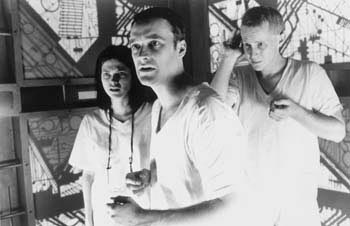![[MetroActive Movies]](/gifs/movies468.gif)
[ Movies Index | Metro Santa Cruz | MetroActive Central | Archives ]
No Way Out
Metaphysical 'Cube' traps whiny Canadians
By Michael S. Gant
FIRST THERE WAS Sphere--now there is Cube. In this low-budget Canadian feature by Vincenzo Natali, seven people awake inside a literal nightmare: a high-tech "prison" in which all the cells are fitted together to form a giant cube. Each side of each cell contains a hatch that leads to another cell. Some cells are booby-trapped, and the whole infernal machine operates like a malign Rubik's Cube--once every cycle of permutation, a gateway opens to the outside. The only apparent key to deciphering the cube is the numbering system of the cells.
At first, Cube plays like a cooler, hipper Clive Barker film. One of the captives jumps into a new cell and is immediately filleted into neat segments by an invisible grid of razor wires; another gets a face full of acid for his troubles. The oppressive cleanliness of the cells (which look like they were assembled from giant glass circuit boards) and the constant humming of the machinery that moves them around combine to create an atmosphere of grinding tension as the remaining five captives try to puzzle their way to freedom.
Unfortunately, Natali soon abandons mechanics for metaphysics. The cube isn't "real"--it's a metaphor for society, or for the future, or for something. There is no purpose to this hellish incarceration--the "inmates" are just pawns trapped unwittingly in a bureaucratic absurdity. There is no meaning to their ordeal; their suffering is ... "existential" (and the script sounds like the excited speculations of freshman philosophy students after their first exposure to Sartre).
Increasingly frustrated by their fate, the characters start to strip down to their emotional cores. Holloway (Nicky Guadagni) shrilly complains about government conspiracies. Gen-X math whiz Leaven (Nicole de Boer) protests that she only wanted to be left alone by life. Worth (David Hewlett) falls back on the Nuremberg defense. Quentin (Maurice Dean Wint, in the film's strongest performance), a take-charge cop, gets in touch with his inner fascist. (In no-exit dramas like this, there always comes a "You can't handle the truth" moment when the cop/soldier/enforcer grabs the liberal by the labels and shouts something about how people like him make society possible by doing its dirty work. And Cube doesn't disappoint in this regard.) By the time the characters start blathering in earnest--"We're still human beings--that's all we've got left," "Not all of us have the power to play the nihilist"--I started plotting my own escape by factoring the aisle numbers on the arms of the seats in the theater.
[ Santa Cruz | MetroActive Central | Archives ]
Copyright © Metro Publishing Inc. Maintained by Boulevards New Media.
![]()

Geometry of Despair: Nicole de Boer, David Hewlett and Andrew Miller have no hope of pardon in 'Cube.'
Cube (R; 92 min.), directed by Vincenzo Natali, written by Andre Bijelic, Graeme Manson and Natali, photographed by Derek Rogers and starring Nicole de Boer, Maurice Dean Wint and Nicky Guadagni.
From the December 9-16, 1998 issue of Metro Santa Cruz.